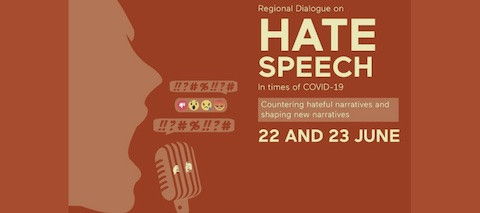
GCED Basic Search Form
Quick Search
You are here
News

UNESCO New Delhi organized a two-day regional dialogue, “Hate speech in the times of COVID-19”, on 22 and 23 June, with the aim of promoting dialogue around the growing issue of hate speech during the global pandemic.
The dialogue mobilized a variety of experts from around the world to contribute to the discussion. Speakers included representatives from academia, law, civil society, governments, media organizations, journalists, social media companies, and development partners.
Over the two days, speakers deliberated on the root causes, manifestations and risks of hate speech around the world, and exchanged best practices in countering and addressing hate speech through various sectors.
The first panel, given the task of setting the context and deconstructing hateful narratives, agreed on the importance of local and bottom-up research to understand and respond to structural, historical and nuanced drivers of hate, including in South Asia. Speakers pointed to shifts in discussions about hate speech, including the recent growth in hate speech detection through algorithms used by artificial intelligence, while pointing to the need for human-centric debates and solutions.
The second panel, tasked with capturing key solutions and strategies for promoting peaceful narratives, stressed the need for a multi-layered and multi-disciplinary endeavour. Speakers representing both traditional media and social media channels spoke about the important role of journalists and media professionals in shaping communications and promoting through their work high standards and fact-based reporting and media content.
Growing levels of hate speech and polarization present us with an urgent challenge to promote and protect the freedom of expression while standing firm against all forms of intolerance.
-- Eric Falt, Director of UNESCO New Delhi
Building resilience to and awareness of hate speech through education, particularly through media and information literacy, and educating youth on their online and offline responsibilities and rights, were pointed out as a key interventions in this work. Panellists also shared experiences in the use of innovative methods, such as comedy and counter messaging campaigns to promote tolerance.
Finally, both discussions emphasized the important role of decision-makers in promoting inclusive public policies that move beyond regulation of content to promoting freedom of expression and the shared values of tolerance and acceptance in societies.
The dialogue concluded with reflections on the need for stronger partnerships and renewed commitments from all sectors to mobilize and stand up against hate speech, particularly in the midst of recent and new manifestations of hate during the COVID-19 pandemic. Through this multi-sectoral effort to tackle hate speech, UNESCO and its key partners can contribute to building more peaceful societies.
Useful links:
- Global citizenship education
- Preventing violent extremism through education
- UNESCO publication – Countering online hate speech
URL:
